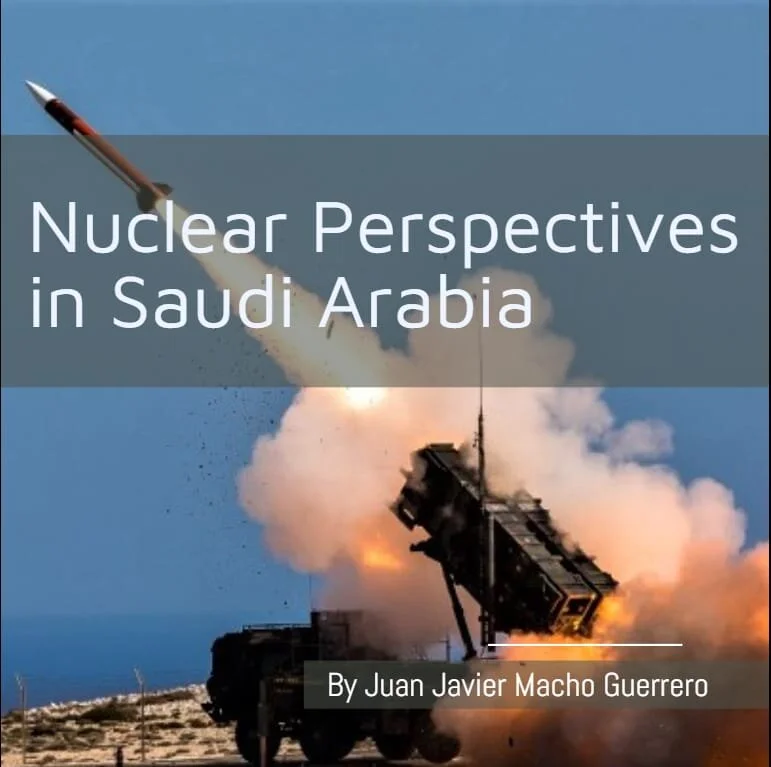Riddled with persistent conflicts, bitter rivalries and a plethora of economic, social and political fractures, the Middle East stands today as one of the most convoluted regions of the globe. As such, the international community holds a great interest in promoting effective policies to avoid the proliferation of weapons of mass destruction. The tensions coming from Iran's nuclear program have been for long a top priority in this area, but other regional actors should not be overlooked, as they may play an important role in the near future’s nuclear dynamics. This is the case of the Kingdom of Saudi Arabia, whose perspectives on nuclear technology, both for civil and military uses, will be explored in this article.
The Central Role of Memes on Alt-Right Radicalisation in the “Chanosphere”
The internet forms an important component of ideological radicalisation, as it provides a platform for like-minded individuals to communicate in virtual communities like the ‘Chanosphere,’ which in turn allows for extremist groups to develop safe havens of communication and information exchange [1]. Using the case study of a cluster of alt-right terrorist attacks initiated by the Christchurch mosque shootings in 2019, this analysis will demonstrate that alt-right memes played a central role in radicalisation, in that they acted as vessels of encoded racist ideology which used ‘weaponised irony’ as a means of communicating group identity
India’s Act East Policy: Strategic Rationales and Maritime Strategy
India’s contemporary relations with Southeast Asia can be viewed through a prism of historical, religious, and cultural influences which it has had in the region for more than a millennium. These relations include the ancient Indianised kingdoms and maritime empires of Sailendra, Funan, Majapahit and Khmer respectively and a legacy that continues to be celebrated through the spread of the Hindu, Buddhist and Islamic faiths which have shaped the contemporary societies of these states.
Challenges Faced by Social Media in Curbing Misinformation
The spread of misinformation, especially during the pandemic has posed several challenges for social media companies. The structure of their algorithms and exploitation of human biases have exacerbated the impact of misinformation. Despite the efforts by social media companies, misinformation has continued to grow at an enormous scale which has further endangered life during the pandemic.
Moon Rush: The First Step In A New Security Space
We are currently on the verge of a new age in space activities. The proliferation of lunar exploration programmes and plans to build the first permanent settlements in the 2030s could have a great impact on future international economic and political dynamics. But what are the reasons to think of the Moon as a strategic objective? What countries are trying to capitalise on it? In the following article, I will try to answer both questions.
The Russian Disinformation Campaign in the Western Balkans
After the 2014 annexation of Crimea and the EU- and US-imposed sanctions on Russia, the Kremlin employed a counter-strategy: disinformation and propaganda. The Western Balkans, a key strategic partner to the EU and NATO, became a fertile ground for Russian disinformation campaigns. Capitalizing on ethnic divides, weak institutions, and the deteriorating freedom of media, the Kremlin inserted itself into the region. Using Serbia as a launch site for disinformation, Russia established a regional base for the Sputnik news agency in Belgrade.
Exploring the Legality of US Humanitarian Assistance to Venezuela
For years Venezuela has been affected by mass displacement and famine, caused by natural disasters and a significant economic crisis. At the beginning of 2019, the United States sent food and medicines to the population of Venezuela to help mitigate the situation. President Nicolás Maduro— sworn in for a second term in January of the same year — refused to accept the help of the United States and ordered the barricade of the bridge where the American aid was supposed to be transported.
Ethiopia’s Internet Shutdowns: Contributing to humanitarian catastrophe in the Tigray
Internet shutdowns are becoming increasingly common across Africa. In Ethiopia, the practice has proven to be one of the government’s favoured tools to control information reaching its subregions’ ethnic groups since at least 2015. After the start of the Tigrayan War in November 2020, Internet cuts have heavily contributed to the creation of the humanitarian crisis.
Market for Force: The Emerging Role of Private Military and Security Companies in Non-Traditional Fields
Previous articles in this series have shed light on the evolution of Private Military and Security Companies (PMSC). Growing beyond the commonly held conceptions in academia and of the industry itself, PMSCs are involved in conflicts around the world. Used by both states and non-state actors, these companies are also branching out into other demographics and types of security. These include intelligence gathering and analysis as well as cyberspace, domains that are typically the preserve of states. The cyber realm has not only been populated by a number of private cybersecurity firms but also hackers-for-hire willing to strike anyone anywhere. Additionally, this article will briefly explore the emerging opportunities for PMCSs in Latin America and China.
Market for Force: The Emerging Role of Private Military and Security Companies in Contemporary Conflicts
Public perception of Private Military and Security Companies (PMSCs), or more colloquially mercenaries, is skewed and heavily influenced by pop culture [1]. PMSCs are not cowboys protecting a town from crime any more than they are the desperados terrorizing and extorting it. Rather, today, they are corporate entities acting on behalf of a state or another non-state actor (often NGOs or private corporations). The 21st century PMSC is more often involved in logistics, support and training than in actual combat. The combat that they do partake in is typically isolated or a defensive detail
Market for Force: The Emerging Role of Private Military and Security Companies in Anti-Piracy Operations
This article will consider private military and security companies (further referred to as PMSCs) as violent, non-state actors and as a threat to existing theories of the state system. This article uses the case study of PMSCs used to protect private vessels travelling through the Indian Ocean and the Gulf of Aden against piracy. It describes the way that PMSCs became involved in this sector and how they continue to stifle piracy, in accordance with state-centred efforts..
Market for Force: The Emerging Role of Private Military and Security Companies
Today, Private Military and Security Companies (PMSC) represent a growing and neglected topic in international security. Currently, various forms of PMSCs are known to be active in Yemen, Libya, Syria, Belarus, Afghanistan, and Ukraine, and were also instrumental in the recent Nagorno-Karabakh conflict. Furthermore, PMSCs are active in non-traditional roles such as the Cartel Wars in Mexico, the Gulf of Aden protecting freighters from Somali pirates, and, beyond these more obvious examples, PMSCs have taken on support roles for standing militaries.
Hypersonic Weapons: Challenging the Hype
A prevailing orthodoxy is recently emerging around hypersonic weapons. It is one characterised by eminent and imminent threat. This impression is largely misguided and misleading and should be challenged. Hypersonic weapons are an awesome military power that threatens to totally upend the conduct and course of modern warfare. A prevailing orthodoxy is recently emerging around hypersonic weapons. It is one characterised by eminent and imminent threat.
Middle-Power Space Strategies: A Comparison of Canada and South Korea
Space policy issues are often framed in the context of great power competition. States like Russia, the People’s Republic of China and the United States are the main drivers of technological innovation in this area, but their rivalries also constitute barriers in negotiations regarding international governance. Nonetheless, space efforts of middle powers are not just important for the preservation of these states’ economic position in the international system but
Weaponisation of Female Bodies: Rape as a weapon of war in the DRC
The Democratic Republic of Congo is facing “ a war within a war”, in reference to the large number of rapes perpetrated during the ongoing conflict in the Kivus. The academic literature has widely documented how rape is used as a weapon of war by combatants against women in the country. Several factors can explain, but never justify, the use of rape as a weapon of war. The two prominent ones are poverty and patriarchy. However, some researchers have challenged the ‘rape as a weapon of war narrative’, warning that this account excludes the increasing number of rapes perpetrated by ‘ordinary citizens’.
Weaponisation of Female Bodies: The Forgotten Voices of Yazidi Women
In 2014, the weaponisation of the female body materialized once again when Da’esh systematically raped and tortured thousands of Yazidi women, starting a genocide against the Yazidi people. Wrongfully labelled as dirty devil-worshippers by others, the Yazidi have suffered continuous massacres throughout history and are now faced with unbearable physical and mental traumas from the horrors brought upon them by Da’esh.
Weaponisation of Female Bodies: Violence Against Women by Cartels and Gangs in El Salvador, Honduras, Guatemala, and Mexico
In male-dominated cultures characterised by machismo, women are victims of violence on a daily basis. In Latin America, hundreds of women are killed every year, simply for being women. Against this panoramic backdrop, this article focuses on the most severe form of violence against women (VAW); it concentrates on structural anti-female violence, particularly the weaponisation of the female body.
Weaponisation of Female Bodies: Inaccurate Reports of Sexual Violence in the Donbas Conflict
The use of bodies as weapons of war in the Donbas conflict is denied by the Ukrainian government and United Nations official reports, contrasting non-governmental organisation (NGO) documents which report the contrary. This article explores the gap between the survivors' testimonies, as captured by NGO research, and the official reports and questions the reasons for low victim reporting and high perpetrator impunity.
Bargaining with Foreign Policy: The Potential Unintended Consequences in Sudan
Sudan is at a democratic crossroads. In September 2019, following months of bloody protests, the thirty-year Islamic dictatorship of Omar el-Bashir was ended. [1] and a new interim civilian-military government, the Transitional Military Council (now the Sovereignty Council of Sudan), took his place. [2] The aim of this Council is to transform Sudan into a fully democratic state by 2022. [3] However, certain military elements, along with a still significant minority of Bashir’s Islamist National Congress Party still in Parliament are strongly opposed to this new objective.
Global Internet Governance
The internet’s history is one of openness and decentralized control, largely supported by a US-led push for a laissez-faire approach to internet governance. An open internet was believed to be an essential building block of liberal world order, and any real drive towards global governance would open up the door to repressive regimes looking for justification to clamp down on online freedom (with China’s “great firewall” as the most obvious example).





















